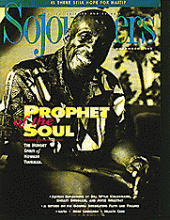Advent couldn't be more out of step with the doings of the dominant culture. Against the inflation and distortion of the commercial powers hyping their seasonal wares, it sets a spirit of barebones simplicity: John the Baptist, in domicile, diet, dress, putting an axe to their bloody roots.
Against the manufactured and well-targeted desire for things, Advent invokes that single-minded hunger--a yearning truly for God alone. Against the awful clamor and din that silences all contenders, this season sets that Word irrepressible. Against the grandiose and pretentious pose that goes with empire, it posits the hidden and unexpected. Over against despair that has become the emblem of political rule in our day, it utters a hope that thereby becomes freedom. Against dissipation and distraction, by which we are also controlled, Advent commends spiritual alertness. As the readings from Isaiah will suggest, Advent reminds us that we are exiles and resident aliens in a strange, strange land.
For all that, it is a season to make the heart sit up and take notice. In fact and practice, Advent exemplifies the characteristic attitude of believers approaching scripture itself: an urgent expectancy, a patient watching, and attentive listening for the coming of the Word.
Bill Wylie-Kellermann, a Sojourners contributing editor, was a United Methodist pastor and the author of Seasons of Faith and Conscience (Orbis, 1991) when this article appeared.
November 28: Pray for Disruption
Isaiah 63:16-64:8, 1 Corinthians 1:3-9, Mark 13:32-37, Psalm 80:1-7
To begin, in Advent we pray for the end.
Read the Full Article

